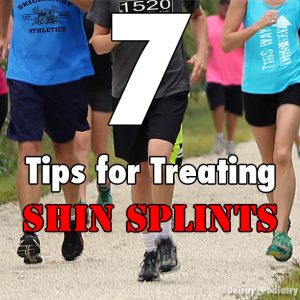A common exercise related ailment, shin splits are in fact not a specific injury, but instead may be a symptom of a number of possible injuries of the lower leg such as a tibial stress fracture or anterior tibialis tendonitis.
These injuries may result in swelling, weakness, numbness, and often cause a constant or intermittent pain in the soft tissues located in the front of the outer leg (tibia). Shin splints occur most commonly in runners, but in reality any rigorous activity in which repetitive stress is placed on the shin can bring about this condition.
It is more likely for a person to incur shin splints when their leg muscles and tendons are tired or if the intensity of their workout is rapidly increased. Women, people with flat feet or rigid arches, athletes, military recruits, and dancers all have an increased likelihood of developing shin splints.
There is no specific cure for shin splints, but the following tips should help alleviate the pain of this common injury:
1. Rest
One of the most effective treatments for shin splints is thankfully one of the easiest. It is important to give your body adequate amounts of rest in order to reduce swelling and let the injury heal naturally. If you live an active lifestyle and complete rest is not an option, significantly decreasing your running mileage or intensity of your workout is recommended. There are also several alternative exercises that create less impact on the lower legs, such as swimming, biking or walking.
2. Ice
Ice your shins for 10 to 15 minutes roughly 3 or 4 times a day to help reduce swelling and prevent possible tissue damage. If using an ice pack or bag of ice, be sure to place a layer between your skin and the ice to prevent any damage to your skin from frostbite.
3. Anti-inflammatory Medication
Nonsteroidal anti-inflammatory drugs (NSAIDs), such as ibuprofen or aspirin, will help reduce inflammation, and ease pain caused by shin splints. You can purchases NSAIDs without a doctor’s order, but it is recommended that you check with your physician before beginning any new medication to find out which medicine is right for you and the proper dosage. NSAIDs can cause stomach bleeding or kidney problems if not taken correctly.
4. Compression
Compressing the shins with athletic tape, an athletic wrap, or a compression sleeve may help alleviate the pain of shin splints. Compressing the area serves to support the muscles and reduce vibration and stress during your exercise. It may also help reduce swelling and help retain body heat, which allows for greater blood flow to the affected area, and may help speed up recovery.
5. Wear Proper Shoes
Wearing an old or poorly fitting pair of shoes can greatly increase your chances of developing shin splints. If your shoes are broken down or old then they have likely lost their ability to control the rotation of your foot and absorb shock. Finding the right shoe is essential for anyone looking to avoid injuries and the correct type of shoe can differ greatly from individual to individual. In some cases, a podiatrist may need to craft an orthotic insert specifically for your feet in order to get the best support possible.
6. Avoid Hard Surfaces
The surface you run on has a direct impact on your body, and may play a role in your shin pain. Hard surfaces are often unforgiving and place the greatest amount of stress on your shin bones. That being said, avoid running on surfaces such as concrete or asphalt as it adds further stress on your shins. These harder surfaces create greater impacts and make your anterior tibialis muscle work a lot harder. A good alternative for track and field athletes is to run on grass until shin splints pain has subsided.
7. Visit a Doctor
If no at-home treatments succeed in relieving the pain caused by shin splints, contact your healthcare provider as you may be suffering from a more serious fracture.
—
Follow Delray Beach Podiatry on Twitter @Delray_Podiatry
The content on this website is for informational purposes only. Do not rely or act upon information from www.DelrayBeachPodiatry.com without seeking professional medical advice. If you live in South Florida and would like a consultation with Dr. Ian Goldbaum, a podiatric physician and surgeon with over 30 years of experience, please see our contact information below:
BOCA/DELRAY
16244 S. Military Trail #290, Delray Beach, FL 33445
561-499-0033
BOYNTON BEACH
8198 Jog Road #100, Boynton Beach, FL 33472
561-499-0033


No responses yet